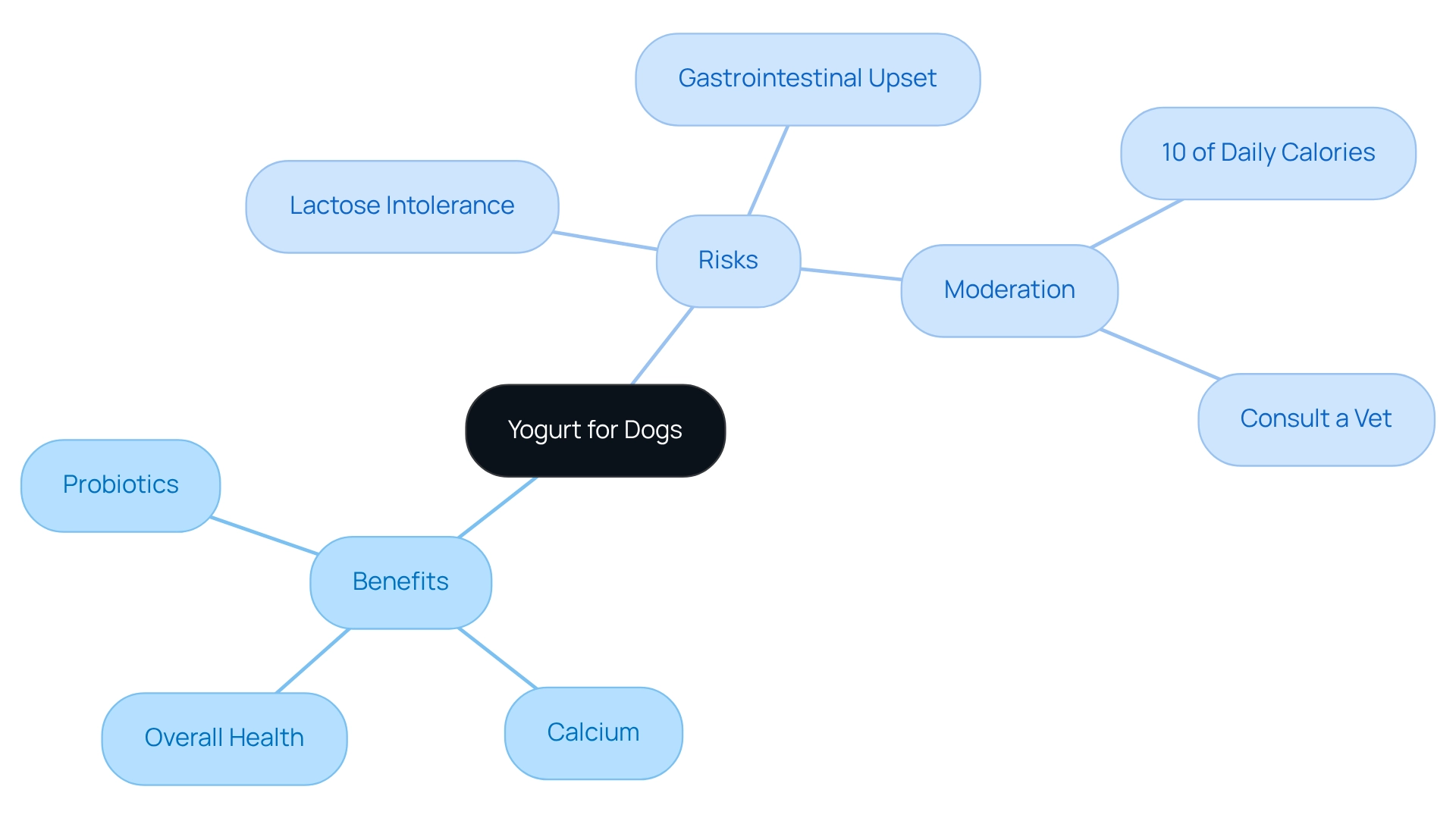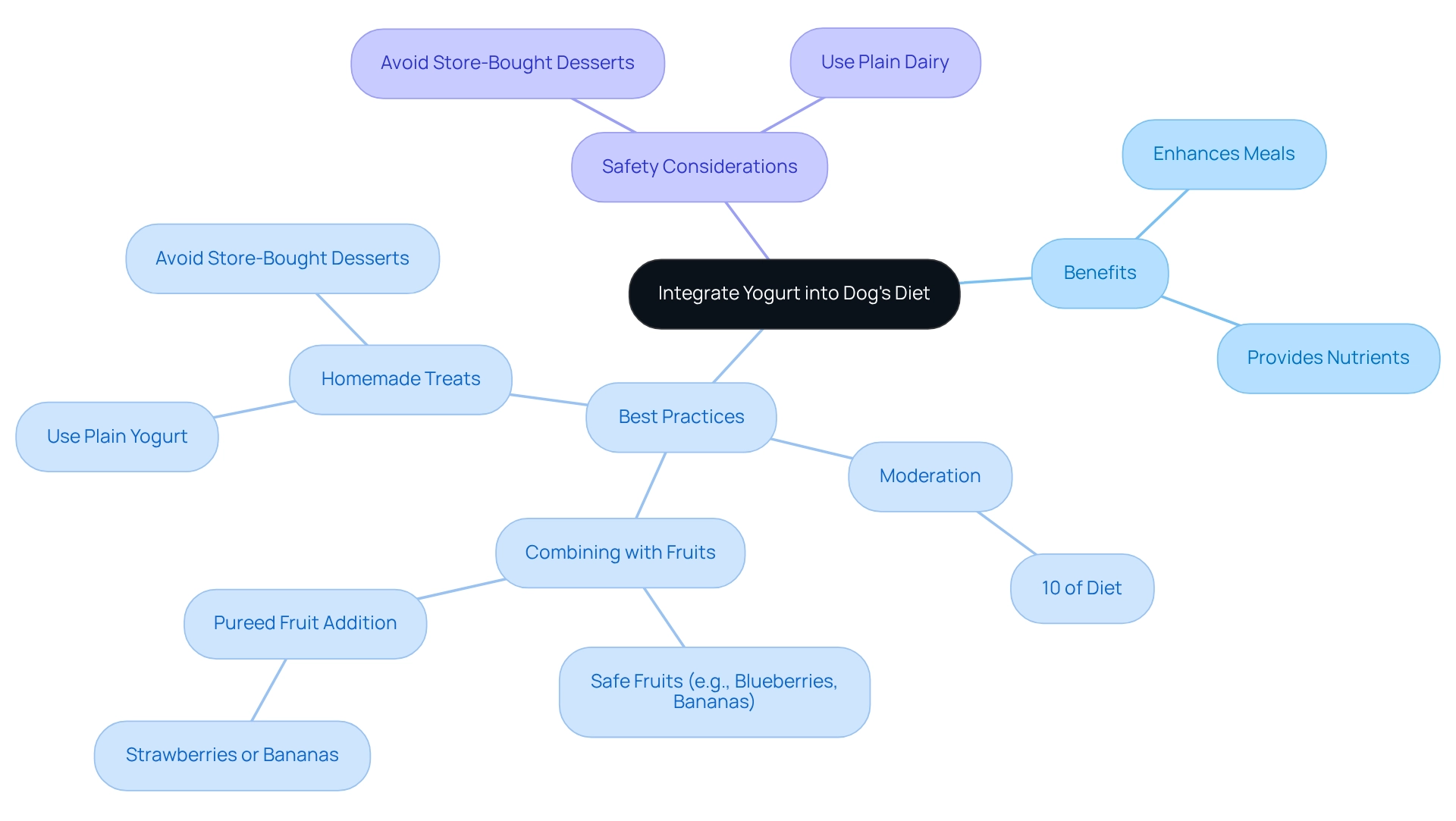
Can Dogs Eat Yogurt? Understanding Its Benefits and Risks
Overview
As a loving pet owner, you may wonder about the best ways to nourish your furry friend. Dogs can indeed enjoy yogurt, especially plain or Greek varieties, which offer beneficial probiotics and essential nutrients like calcium. When shared in moderation, yogurt can be a delightful addition to their diet.
However, it’s crucial to choose yogurt that is free from added sugars or artificial ingredients, as these can harm your pet’s health. To keep your dog happy and healthy, it’s recommended that yogurt should only make up about 10% of their diet. This is particularly important for dogs with lactose intolerance, as it helps prevent any digestive discomfort.
Remember, your dog’s well-being is a priority, and making informed choices can lead to a happier, healthier life for your beloved companion.
Introduction
In the quest for optimal canine nutrition, many pet owners find themselves concerned about what to feed their beloved companions. Yogurt, with its delightful creaminess and health benefits, emerges as a noteworthy contender, offering both flavor and nourishment for dogs. This creamy dairy delight, rich in probiotics and calcium, has the potential to enhance a dog’s diet when introduced thoughtfully. However, it’s important to recognize that not all yogurts are created equal. Pet owners must navigate the landscape of options with care to ensure they choose varieties that are safe and beneficial for their furry friends.
Understanding the different types of yogurt available can be overwhelming, and the potential risks associated with certain products can add to the anxiety. As caring pet owners, we want to provide the best for our dogs, and this exploration delves into how yogurt can be a valuable addition to their diet. It emphasizes the importance of moderation and careful selection, reassuring readers that with the right approach, yogurt can become a delightful treat that supports a dog’s health and happiness. Together, we can make informed choices that reflect our love and commitment to our pets’ well-being.
Define Yogurt: Composition and Types
Yogurt is a beloved dairy product, crafted through the fermentation of milk by beneficial bacteria known as probiotics. This gentle fermentation process transforms lactose into lactic acid, giving yogurt its delightful tangy flavor and creamy texture.
For our furry friends, it’s important to choose the right type of yogurt, as you may wonder, can dogs eat yogurt? Plain yogurt stands out as the best option for canines, as it contains no added sugars or artificial ingredients that could harm their health. Greek yogurt, with its thicker consistency and higher protein content, has become a popular choice among pet owners who want to give their dogs a nutritious treat.
As noted by Ariane Lang, while regular yogurt may offer fewer calories and more calcium, Greek yogurt provides more protein and less sugar, which can be beneficial for our pets. However, flavored yogurts, often laden with fruits or sweeteners, should be avoided due to their potential risks for dogs. Understanding these distinctions is vital for pet owners who want to determine if can dogs eat yogurt as a healthy dietary supplement for their beloved companions.
Additionally, adding herbs and spices to yogurt can enhance digestive health and promote the growth of beneficial probiotic bacteria, further supporting canine wellness. Research indicates that one of the healthiest choices for dogs is natural probiotic yogurt, which raises the question: can dogs eat yogurt, particularly when it is free from added sugars?
Furthermore, differential abundance analysis has revealed significant variations (p < 0.05) in the benefits associated with different types of fermented dairy. In conclusion, when determining if can dogs eat yogurt, it is crucial to opt for plain or Greek varieties, ensuring they are free from harmful additives. This knowledge empowers pet owners to make informed dietary choices that truly benefit their dogs.
Explore Nutritional Value: Benefits and Risks for Dogs
Many pet owners cherish the numerous nutritional benefits that yogurt can provide, leading them to ask, can dogs eat yogurt as a wonderful addition to their dog’s diet? It serves as a source of probiotics, which are beneficial for digestion and gut health. These probiotics help maintain a balanced gut microbiome, potentially reducing digestive issues and enhancing overall well-being. Additionally, this dairy product is rich in calcium, an essential nutrient for preserving strong bones and teeth, contributing positively to your dog’s overall health.
However, it’s crucial to recognize that not all dogs can tolerate dairy products, especially those with lactose intolerance, which may lead to gastrointestinal upset. As caring pet owners, it’s important to thoroughly examine the components of any dairy products you consider, ensuring they are safe for your furry friend. Avoid flavored options, as they often contain added sugars and synthetic ingredients that can be harmful to pets.
Moderation is key when incorporating dairy into your dog’s nutrition. Research suggests that this dairy product should only constitute a small portion of your dog’s daily caloric intake—ideally no more than 10%. This aligns with the guideline that 90% of your dog’s daily calories should come from complete dog food, while 10% can be from treats. Excessive consumption can lead to digestive discomfort or weight gain, highlighting the importance of observing your dog’s reaction to this treat. Consulting with a veterinarian is always a wise choice, especially if your dog has a history of digestive issues or dairy allergies.
In summary, while it is important to consider whether can dogs eat yogurt for its beneficial nutrients and probiotics, it should be offered as an occasional treat rather than a regular part of their diet. This ensures it complements a balanced nutritional plan. Remember, moderation is essential when introducing any new food into your dog’s meals, and your attentive care makes all the difference in their happiness and health.

Address Common Concerns: Safety and Serving Guidelines
When considering the addition of dairy to your dog’s nutrition, such as whether can dogs eat yogurt, it’s essential to approach this with care. Begin with small quantities to gauge their tolerance, as each dog is unique. A helpful guideline is to offer one teaspoon of plain dairy for every 10 pounds of body weight, adjusting based on your dog’s individual response. As a loving pet owner, it’s important to stay alert for any signs of allergies or digestive issues, like vomiting or diarrhea. If you notice these symptoms, please discontinue use immediately. Remember, dairy should complement, not replace, a balanced diet; think of it as an occasional treat or supplement.
Moreover, ensuring that the dairy product is free of additives and preservatives is crucial for your dog’s health and happiness. While many dogs enjoy dairy, it’s vital to observe their reactions closely to answer the question of whether can dogs eat yogurt, as some may struggle with lactose intolerance. If your dog accepts dairy well, it can provide beneficial probiotics that support digestive wellness, making it a valuable addition to their diet. Always ensure your furry friend has access to fresh, clean water, which is essential for their overall well-being.
As interest in healthy dietary options for pets continues to grow—evidenced by a 500% increase in inquiries for natural pet food and supplement brands over the past decade—incorporating dairy products can be a positive step for many pet owners. Expert Jaye Schissel suggests exploring healthy snack options, such as nitrite-free beef or turkey jerky, to complement dairy products as part of a balanced eating plan. Together, we can ensure our pets thrive with the love and nutrition they deserve.
Integrate Yogurt into Your Dog’s Diet: Best Practices
When considering whether can dogs eat yogurt, including dairy in a dog’s diet can be a delightful and beneficial choice when approached with care. As devoted pet owners, you have the opportunity to enhance your dog’s meals by thoughtfully blending plain dairy with their regular food, adding both flavor and essential nutrients that can brighten their day. Imagine treating your furry friend to refreshing frozen dairy snacks on warm days—these bite-sized delights can be a wonderful way to keep them cool and happy. However, it’s essential to remember that moderation is key; dairy should comprise no more than 10% of your dog’s overall intake to ensure their health and well-being.
For those canines that relish diverse flavors, consider blending dairy with pet-safe fruits like blueberries or bananas. This combination not only results in a wholesome and tasty option but also caters to their natural curiosity about food. As Lynn Guthrie wisely suggests, ‘You can incorporate fresh, pureed fruit such as strawberries or bananas into the dairy product before freezing.’ This gentle approach allows you to provide your dog with nutritious treats that they will love.
While plain frozen dairy treats are generally safe for dogs, it’s important to be cautious with store-bought frozen desserts, as they often contain flavorings or sweeteners that can be harmful. Instead, homemade frozen dairy dessert treats made with plain dairy and safe fruits serve as an excellent alternative, offering a refreshing snack that aligns with expert guidelines for healthy dog treats. By following these best practices, you can ensure that your beloved pet enjoys the benefits of yogurt in a safe and delicious manner, while also confirming if can dogs eat yogurt, reinforcing the bond you share through thoughtful care.

Conclusion
Yogurt can be a delightful addition to your dog’s diet, offering a wealth of benefits when introduced with care. Its rich composition of probiotics and calcium not only supports digestive health but also strengthens bones, making it a wonderful supplement for many furry friends. Yet, it’s crucial to choose wisely; plain and Greek yogurts are the best options, while flavored varieties should be avoided due to potentially harmful additives.
When incorporating yogurt into your dog’s diet, moderation is key. It’s wise to limit yogurt to no more than 10% of your dog’s daily caloric intake, ensuring it complements a balanced diet rather than replacing essential nutrients. Beginning with small amounts allows you to monitor your dog’s tolerance, especially if they are lactose intolerant. As with any dietary change, consulting a veterinarian can offer personalized guidance, reinforcing the importance of safe practices.
In conclusion, yogurt can be a delightful and nutritious treat that enhances your dog’s overall health when given appropriately. By following best practices and maintaining moderation, you can enjoy the rewarding experience of integrating this creamy delight into your beloved pet’s diet. Ultimately, making informed choices about canine nutrition reflects a heartfelt commitment to the well-being of your cherished companions.
